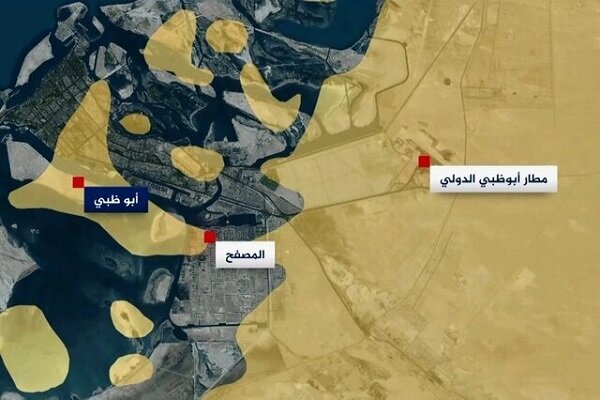Amir Mousavi, speaking in an interview with the website of the Strategic Council on Foreign Relations, said that with Ansarollah attacking parts of the UAE, the tactics and strategy of Yemen in the war changed, noting: The UAE had previously withdrawn from a direct confrontation with Ansarollah, and from 2019 and early 2020 we saw that the country focused only on ports, islands and places far from Ansarollah’s reach.
He continued: The UAE formed the “Al-Amalqa” militia to control the areas under the control of “Mansour Hadi” in order to advance with this group instead of clashing with Ansarollah, but after compromising with the Zionist regime and some field developments to the detriment of the Saudi coalition, the UAE decided to confront again in Yemen so that Ansarollah would not completely dominate over the strategic areas of Marib, Shabwa and Al-Hudaidah.
The expert on West Asia affairs said: With the UAE re-entry into the war and some of the coalition progress, Ansarollah announced that the UAE will be its target from now on, and a week later, it put its threats into operation. With this action, the equations of the region changed completely; because the UAE did not believe at all that Ansarollah would have the power and authority to attack targets with such accuracy from a distance of about 1,800 to 2,200 kilometers.
Saying that the UAE thought its defense, anti-aircraft and patriot systems could prevent the attacks, but was “completely surprised” by such attacks, Mousavi added: Given that Al Dhafra Air Base, owned by the US, is located 32 km south of Abu Dhabi, the UAE thought the base could provide its security. A spokesman for the Yemeni armed forces, detailing operations deep inside Saudi Arabia and the UAE, stressed that the base and other critical targets in Abu Dhabi had been targeted by a large number of ballistic missiles, and that other critical targets in Dubai had been targeted by drones.
Zionist regime’s supports for UAE
He reminded: During the Ansarollah attacks, we witnessed that the Zionist regime rendered assistance to the UAE, and the UAE realized that such aid would not be very effective against the Ansarollah attacks. For this reason, in two stages, they bombed the Yemeni communication center completely and started committing horrible crimes by cutting off Yemen’s communication with the world.
The expert on West Asia affairs pointed to the high number of killings of the Yemeni people with the bombardment of the Saudi coalition and Yemen’s emphasis on a resounding response to those crimes, and explained: In the past few days, after the Ansarollah attacks, we have seen the forces affiliated to the UAE, have withdrawn from the territories under their occupation. In fact, with such retreat, they have sent the message that they want the attacks on the UAE be stopped.
Mousavi referred to the visit of the Israeli President, Isaac Herzog, to the United Arab Emirates for the first time and also to the announcement of the Zionist regime in support of that country, and said: The Zionist regime is very concerned because the precise rocket fire on Abu Dhabi showed that Ansarollah could easily access the port of Eilat and the Dimona nuclear facility because they have enough capability to launch missiles and drones with a range of 2,000 km and hit the target accurately; therefore, they will try to increase the capabilities of the UAE as much as possible, and of course, in the recent bombings, this regime entered the field quickly.
European, American pressure on Saudi Arabia to end Yemen war
Referring to the US Secretary of State’s telephone call with his Saudi counterpart, the West Asia affairs analyst stressed: Europe and the United States are pressuring Saudi Arabia to end the war in Yemen, and in their view the actions of the Saudi coalition in that war are not defensible. The UN secretary-general also took a relatively good stance, and by expressing concern, condemned the crimes and killings in Yemen. Although more was expected from the United Nations and other international bodies in response to those killings, under the current situation, public opinion has been shaped in favor of Yemen, and the people of the world consider responding to the crimes of Riyadh as the right of the Yemeni people.
He added: Now the UAE is trying to return to the situation before the attack on Shabwa and refrain from a direct confrontation with Ansarollah, because it has been proven to them that due to the great economic and psychological damage they sustained in the past few days, they cannot continue the current process.
Mousavi, saying that Ansarollah’s missiles had crossed the skies of Saudi Arabia and that the country had not activated its defense systems and had not reacted, noted: Saudi Arabia, although condemning the attacks, was pleased with the damage done to the UAE. So far, those attacks have been carried out on Saudi Arabia only, and now the UAE has also paid the price, but nevertheless, the withdrawal of the UAE will increase its distance from Saudi Arabia.
Serious change in Ansarollah’s strategy towards UAE
The expert on West Asia affairs referred to the US position after the attacks on the UAE to the effect that those attacks were carried out by Ansarollah, and continued: Such attacks were a serious change in the strategy of Ansarollah towards the UAE and showed their authority. At the same time, Saudi Arabia will now take more serious steps to end the war.
He added: Given the widespread crimes that we have witnessed in Yemen, the only issue that can end the seven-year war is the greater authority of Ansarollah; under such situation, if Saudi Arabia wants to stop the war, it has no other option but to negotiate and give some concessions to Ansarollah. In fact, Ansarollah wants to end the siege, hold Yemeni-Yemeni talks, hold a referendum and pay attention to the level of popular base for each group to gain power.










0 Comments